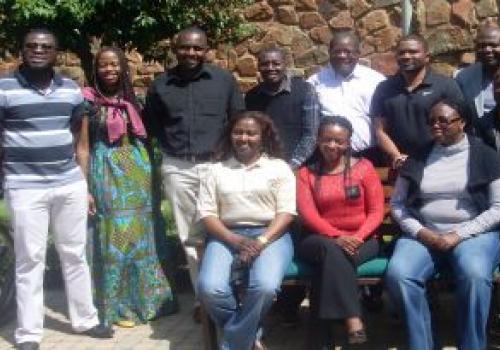SADC Gender Unit held its planning meeting on September 9-11, 2013 in Magaliesburg, South Africa with the aimto introduce the newly recruited staff under the Regional Political Cooperation (RPC) to the Contribution Agreement and to develop their work plans for 2013/2014.
The RPC Programme has five key results areas of which four are implemented under the Organ on Politics, Defence & Security while the Gender Unit is responsible for the implementation of Key Result Area four on Combating Trafficking in Persons (TIP).
The meeting also developed a regional consolidated, harmonised work-plan for the implementation of the fourth Key Result Area (KRA-4) of the Regional Political Cooperation (RPC) programme on Combating Trafficking in Persons, especially women and children, in collaboration with other key stakeholders. The planning meeting was also attended by staff from various SADC Secretariat directorates and units relevant to the planning process such as procurement, finance and monitoring and evaluation as well as key partners from the International Organisation for Migration (IOM) and the United Nations Office on Drugs and Crime Regional Office for Southern Africa (UNODC SARO). The meeting was a perfect springboard setting the implementation of the Key Result Area 4 into motion.
The presentations by the participants emphasised on key terms such as collaboration, innovativeness, timeliness, abiding by approved plans, procurement procedures and financial rules and regulations, and regular monitoring and evaluation in the implementation of the programme activities. It was noted that the scourge of trafficking in persons is one of the challenges requiring urgent regional and national attention in southern Africa. The meeting also noted that most SADC Member States are sources of trafficked persons while some are used as transit countries with the persons destined for other countries, either within the region or overseas.
The KRA-4 component of RPC aims to raise awareness, cooperation and action against trafficking in persons, especially women and children, in the SADC region. This will be achieved through developing and strengthening inter-state cooperation and stakeholder capacity to effectively combat trafficking. Specific activities include, among others:
- Carry out an inventory of national legislations and national strategies on trafficking in persons,
- Developing a regional database on trafficking in persons in SADC,
- Providing technical assistance to SADC Member States without legislation on trafficking in persons to draft legislation, policies, strategic frameworks and standard operating procedures.
- Organising a regional exchange conference on trafficking in persons in the region,
- Developing training curriculum and awareness raising information, education and communication (IEC) materials on trafficking in persons, and
- Facilitating training of trainers for regional stakeholders on combating trafficking in persons in SADC.
The meeting noted women and children make up the majority of the people most vulnerable to trafficking, although in some instances men are targeted by trafficking syndicates for forced labour in mines and farms. SADC Policy framework in addressing trafficking in persons include the Strategic Indicative Plan of the Organ on Politics, Defence and Security Cooperation (SIPO), the Protocol on Gender and Development and the 10 Year SADC Strategic Plan of Action to Combat Trafficking in Persons, Especially Women and Children (2009-2019). The meeting noted with appreciation the fact that at country level, Member states have also shown their commitment to address the challenge by developing Trafficking in Persons (TIP) specific-legislations and action plans.

